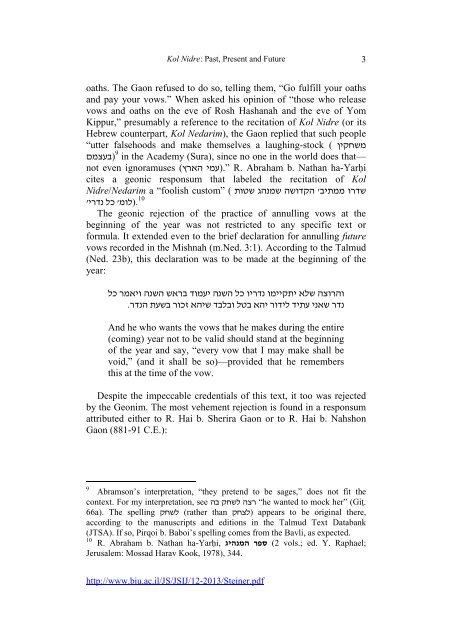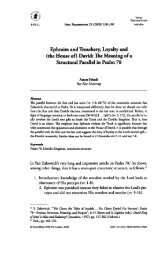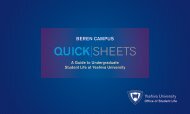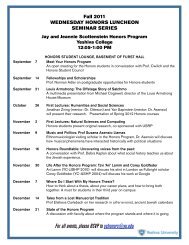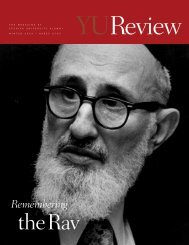Richard Steiner, Kol Nidre - Yeshiva University Blogs
Richard Steiner, Kol Nidre - Yeshiva University Blogs
Richard Steiner, Kol Nidre - Yeshiva University Blogs
Create successful ePaper yourself
Turn your PDF publications into a flip-book with our unique Google optimized e-Paper software.
<strong>Kol</strong> <strong>Nidre</strong>: Past, Present and Future3oaths. The Gaon refused to do so, telling them, “Go fulfill your oathsand pay your vows.” When asked his opinion of “those who releasevows and oaths on the eve of Rosh Hashanah and the eve of YomKippur,” presumably a reference to the recitation of <strong>Kol</strong> <strong>Nidre</strong> (or itsHebrew counterpart, <strong>Kol</strong> Nedarim), the Gaon replied that such peopleמשחקין ( laughing-stock “utter falsehoods and make themselves athat— 9 in the Academy (Sura), since no one in the world does (בעצמםnot even ignoramuses הארץ) ”.(עמי R. Abraham b. Nathan ha-Yarḥicites a geonic responsum that labeled the recitation of <strong>Kol</strong><strong>Nidre</strong>/Nedarim a “foolish custom” ('' ). 10The geonic rejection of the practice of annulling vows at thebeginning of the year was not restricted to any specific text orformula. It extended even to the brief declaration for annulling futurevows recorded in the Mishnah (m.Ned. 3:1). According to the Talmud(Ned. 23b), this declaration was to be made at the beginning of theyear:שדרו ממתיבהקדושה שמנהג שטותלומ' כל נדריוהרוצה שלא יתקיימו נדריו כל השנה יעמוד בראש השנה ויאמר כלנדר שאני עתיד לידור יהא בטל ובלבד שיהא זכור בשעת הנדר.And he who wants the vows that he makes during the entire(coming) year not to be valid should stand at the beginningof the year and say, “every vow that I may make shall bevoid,” (and it shall be so)—provided that he remembersthis at the time of the vow.Despite the impeccable credentials of this text, it too was rejectedby the Geonim. The most vehement rejection is found in a responsumattributed either to R. Hai b. Sherira Gaon or to R. Hai b. NahshonGaon (881-91 C.E.):9Abramson’s interpretation, “they pretend to be sages,” does not fit thecontext. For my interpretation, see רצה לשחק בה “he wanted to mock her” (Giṭ.66a). The spelling לשחק (rather than (לצחק appears to be original there,according to the manuscripts and editions in the Talmud Text Databank(JTSA). If so, Pirqoi b. Baboi’s spelling comes from the Bavli, as expected.10R. Abraham b. Nathan ha-Yarḥi, ספר המנהיג (2 vols.; ed. Y. Raphael;Jerusalem: Mossad Harav Kook, 1978), 344.http://www.biu.ac.il/JS/JSIJ/12-2013/<strong>Steiner</strong>.pdf


